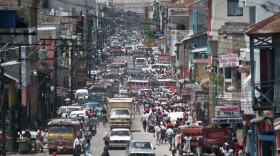
Lulu Garcia-Navarro
Lulu Garcia-Navarro is the host of Weekend Edition Sunday and one of the hosts of NPR's morning news podcast Up First. She is infamous in the IT department of NPR for losing laptops to bullets, hurricanes, and bomb blasts.
Before joining the Sunday morning team, she served as an NPR correspondent based in Brazil, Israel, Mexico, and Iraq. She was one of the first reporters to enter Libya after the 2011 Arab Spring uprising began and spent months painting a deep and vivid portrait of a country at war. Often at great personal risk, Garcia-Navarro captured history in the making with stunning insight, courage, and humanity.
For her work covering the Arab Spring, Garcia-Navarro was awarded a 2011 George Foster Peabody Award, a Lowell Thomas Award from the Overseas Press Club, an Edward R. Murrow Award from the Corporation for Public Broadcasting, and the Alliance for Women and the Media's Gracie Award for Outstanding Individual Achievement. She contributed to NPR News reporting on Iraq, which was recognized with a 2005 Peabody Award and a 2007 Alfred I. duPont-Columbia University Silver Baton. She has also won awards for her work on migration in Mexico and the Amazon in Brazil.
Since joining Weekend Edition Sunday, Garcia-Navarro and her team have also received a Gracie for their coverage of the #MeToo movement. She's hard at work making sure Weekend Edition brings in the voices of those who will surprise, delight, and move you, wherever they might be found.
Garcia-Navarro got her start in journalism as a freelancer with the BBC World Service and Voice of America. She later became a producer for Associated Press Television News before transitioning to AP Radio. While there, Garcia-Navarro covered post-Sept. 11 events in Afghanistan and developments in Jerusalem. She was posted for the AP to Iraq before the U.S.-led invasion, where she stayed covering the conflict.
Garcia-Navarro holds a Bachelor of Science degree in international relations from Georgetown University and an Master of Arts degree in journalism from City University in London.
-
Seventeen missionaries were kidnapped by an armed gang in Haiti on Saturday. It was the latest in what experts are calling a kidnapping crisis in the country — a crisis largely driven by one gang.
-
"State and local governments have really quite broad authority" to mandate the use of face masks during a pandemic, says the head of American University's Health Law and Policy Program, Lindsay Wiley.
-
While early research suggests the condition is rare, experts are still racing to answer even the most basic questions about the illness — such as why some children are more susceptible than others.
-
Debate is raging online about whether profane chants directed at President Dilma Rousseff during Brazil's World Cup match against Croatia were sexist.
-
In Brazil, thousands of protesters clashed with police just hours before the World Cup opening ceremony. The streets of Sao Paolo were filled with tear gas and concussion grenades.
-
Brazil's Catholic Church has threatened a lawsuit against Italian state broadcaster RAI, which has since withdrawn the ad with the famous statue overlooking Rio de Janeiro dressed in "Azzurri" blue.
-
The World Cup kicks off in two days, and fans are pouring into Brazil. But in Sao Paulo, the site of the opening game, metro workers are striking over pay, fueling fierce clashes.
-
There was chaos in Brazil on Friday as striking workers and police clashed and commuters jammed onto overcrowded buses. The list of headaches is growing ahead of next week's World Cup kickoff.
-
The games are just a week away, and enthusiasm is low. Stadiums aren't finished, infrastructure is incomplete, and there have been protests. According to one Brazilian soccer fan, "We didn't deliver."
-
New poll numbers from the Pew Research Center show widespread dissatisfaction in Brazil as the country prepares for the World Cup.






